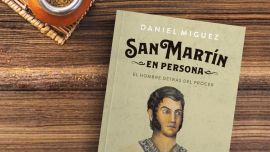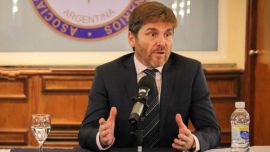Far-left unionist Pedro Castillo and right-wing populist Keiko Fujimori will vie for the presidency of Peru in a run-off election on June 6, after the results of Sunday's first round showed them pulling ahead of the other 16 candidates.
Who are they?
Anti-migrant strike leader
School teacher Castillo was largely unknown in Peru until he led a nationwide strike in 2017.
The 51-year old surprised many by taking the lead – though a narrow one – in the race to become Peru's fifth president in three years. He did not rank among the top five in opinion polls ahead of the vote.
Yet Castillo garnered nearly 20 percent of ballots cast in a first round of voting amid a raging Covid-19 outbreak to which he also fell victim, contracting the virus last year.
Castillo, rarely out without the trademark white, wide-brimmed hat from his home region of Cajamarca in northern Peru – now has a chance to claim the top spot for the small far-left Free Peru party with promises of job creation and tackling crime.
The presidential hopeful burst onto the national scene four years ago when he led thousands of teachers on a near-80-day strike to demand a pay rise and the repeal of an unpopular system for evaluating teacher performance.
The strike left 3.5 million public school pupils without classes to attend, and compelled then-president Pedro Pablo Kuczynski, who initially refused to negotiate, to relent and agree to most of the strikers' demands.
In a bid to delegitimize the protest, then-interior minister Carlos Basombrio claimed its leaders were linked to Movadef, the political wing of the defeated Shining Path Maoist guerrilla group dubbed a "terrorist" organisation by Lima.
Castillo, who had participated in armed "peasant patrols" that resisted Shining Path incursions during the height of Peru's internal conflict from 1980 to 2000, vehemently rejected these allegations.
He arrived on horseback, the traditional means of transport in Cajamarca, to cast his vote in the Tacabamba district on Sunday.
On the campaign trail, he had promised radical change, "not patch-ups or reforms" as he described the proposals of other leftist candidates.
Free Peru's programme is based on boosting health, education and agriculture to improve the lot of Peruvians contending with a recession made worse by the pandemic, as well as rising unemployment and poverty numbers.
Among his more controversial campaign promises, Castillo has vowed to expel foreigners who commit crimes in Peru.
"[We will give] 72 hours to illegal foreigners to leave the country, those who have come to commit crimes," he said in what many perceived as a warning to undocumented Venezuelan migrants who have arrived in their hundreds of thousands since 2017.
To combat crime, Castillo has proposed that Peru withdraws from the American Convention on Human Rights, or San José pact, to allow it to reintroduce the death penalty.
He has furthermore advocated replacing Peru's capitalist-friendly Constitution, promulgated under rightist, populist leader Alberto Fujimori – the jailed father of his rival Keiko Fujimori – in 1993.
Castillo has said Free Peru, if given power, would take control of Peru's energy and mineral wealth, such as gas, lithium and gold, now under run by multinational companies. He has not specified how.
Free Peru is one of the few left-wing Peruvian parties to defend the regime of Venezuelan President Nicolás Maduro, whose 2018 re-election is not recognized by more than 50 countries.
Castillo was born in Puna, a town in Cajamarca, where he worked as a rural school teacher from the age of 24.
He is socially conservative, opposing abortion and gay marriage.
Corruption-accused president's daughter
Heiress of a troubled political dynasty, 45-year-old Keiko Fujimori is taking her third shot at the post once held by her father Alberto.
But the right-wing populist faces a considerable obstacle: charges brought against her by Peruvian prosecutors for allegedly taking money from scandal-tainted Brazilian construction giant Odebrecht to fund previous presidential bids in 2011 and 2016.
Prosecutors have said they would seek a prison term of 30 years and 10 months for Fujimori.
She denies any wrongdoing but spent 16 months in pre-trial detention until her release in May 2020. If she wins, the charges will be suspended until after her term under Peruvian law which exempts sitting presidents from prosecution.
Fujimori leads the Popular Force, a party mixing socially conservative populism with neoliberal capitalism which was the official opposition from 2016 to 2020, when it suffered a crushing defeat in legislative elections.
Fujimori, whose first name means "Blessed daughter" in Japanese, has spent half her life in politics, initially against her will, she has said. When her parents split in 1994, when she was 19, she became stand-in first lady, later breaking ties with her brother in a tussle for the political mantle once held by their father.
Alberto Fujimori, of Japanese descent, is remembered fondly by some for how he dealt with the then-twin problems of hyperinflation and terror, but is in jail today for crimes against humanity committed during his term. Keiko Fujimori has vowed to pardon her father should she win.
In a recent interview, Fujimori told AFP she also wants to "save Peruvians from death and hunger."
The mother-of-two also takes a hardline stance on abortion and gay marriage in a country which already has some of the toughest anti-abortion laws in the region.
by Luis Jaime Cisneros, AFP


























Comments